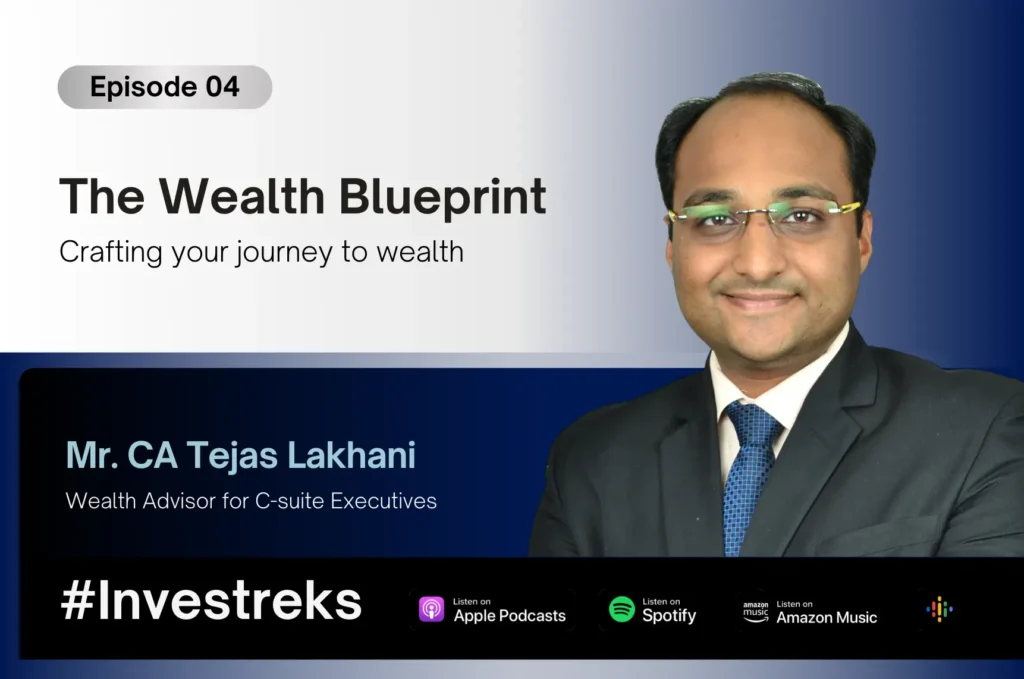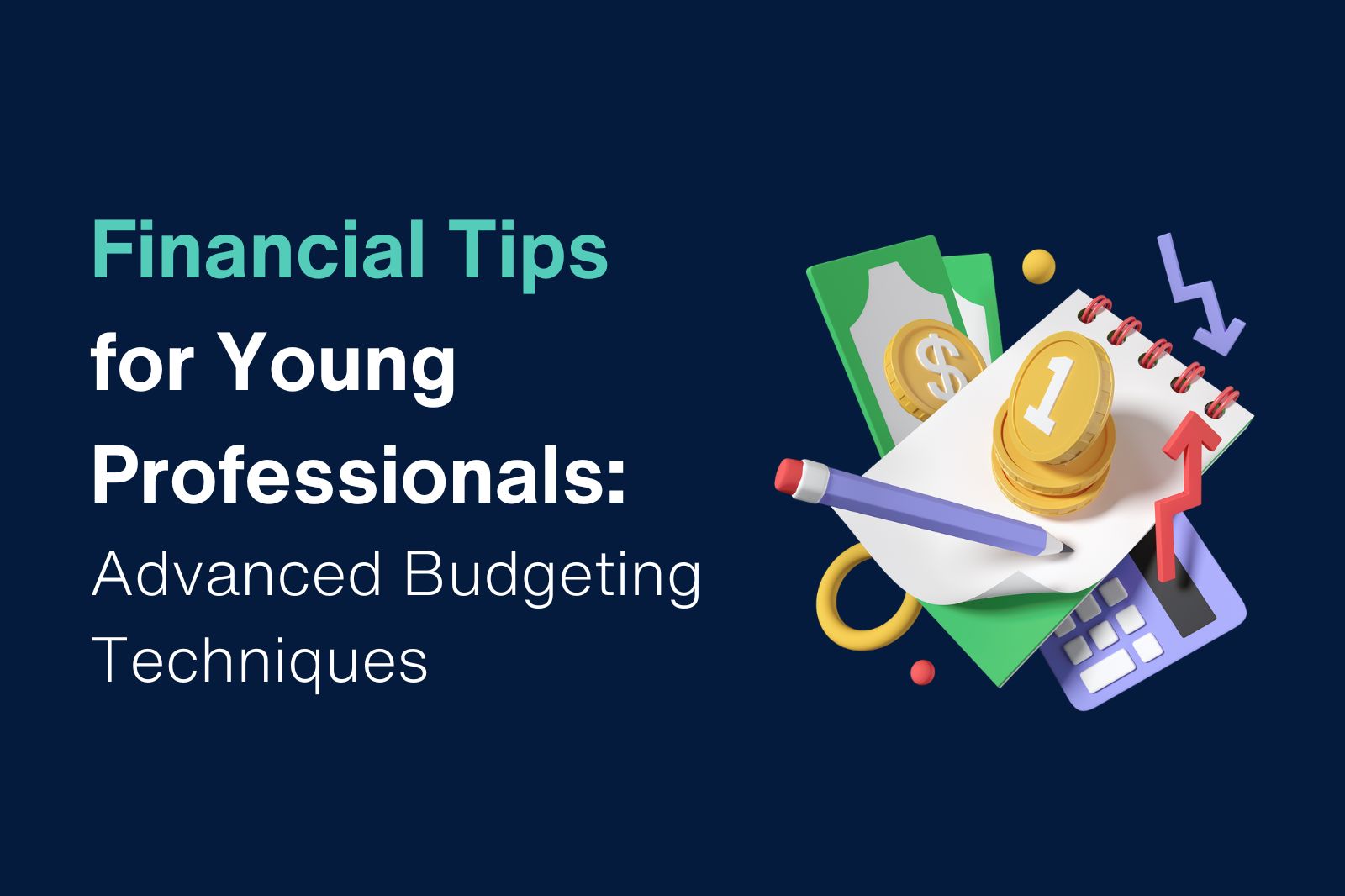The Wealth Blueprint | Investreks EP 04 | Ashton Gray Investments
Investing wisely is a crucial step toward securing your financial future and building wealth.

Mr. CA Tejas Lakhani
- On

Table of Contents
Tag
Share on

Speaker 1 [0:08]
Hello everyone, we’re excited to have you join us on investreks the ultimate podcast designed for inquisitive minds like yours, ready to delve into a treasure trove of financial insight. Get ready to strike confidently in the intricate world of finance

Speaker 1 [0:31]
today, we have with us Mr. Tejas Lakhani, a seasoned chartered accountant passionate about equity and research. He is a dedicated researcher with a passion for equity in financial wisdom, dedicating 30 hours a week to staying abreast of the economy, companies and mutual funds. This professional journey has seen him in pivotal roles advising clients on international tax and transfer pricing with noun MNCs. At Finca, he serves as a financial guide, specializing in crafting solutions for long term financial goals, particularly for major clients such as NRI CXOs, and senior management teams.

Speaker 1 [1:19 ]
Very warm welcome pages. It’s a great pleasure to have you here.

Speaker 2 [1:23]
Thank you, thank you. And very happy to be on in restricts

Speaker 1 [1:27]
thank you pages. So yeah, so let’s get started. And my first question would be that, no, in today’s world, the importance of creating wealth lies in its transformative power. So you know, it provides a safety net during uncertainties empowers individuals to pursue your passions and fosters a legacy for future generations. So I would like to know from you how you would define wealth and why is it essential to create it? Okay,

Speaker 2 [1:53]
so wealth is a sum total of all equitable assets. It may include your properties, Federal Deposit PPF, mutual funds, stocks, or any other assets, which are liquid table. Some of these assets may provide consistent income and some day providing growth. One of them is different for different people. But if you have a sec, which is liquid able that you do not depend on it, then it is called its wealth. However, in general, it should be Batman a set, which gives you peace of mind, that gives you freedom to maintain your lifestyle, and fulfill your desires. When you want to answer why is it essential to create? Well, let’s look at real life example. You are at the age of 60. You have a wife, two kids, and they ask you for a foreign trip. We want to be in a situation where you want to say yes or no. You want to say Yes, right? Yeah, you can say yes, if you have created sizable, sizable wealth. So it’s as simple as that.

Speaker 1 [2:58]
Okay, well said thank you just so wealth creation is vital for securing financial well being and independence. So you know, I came across a study. So according to which individuals who actively engage in wealth creation strategies have a significantly higher likelihood of achieving long term financial success. So that comes with an increase in financial security compared to those who do not prioritize wealth creation. And this point basically takes me to our next question. So that would be what are some specific steps or strategies that have worked well for you or others in creating wealth.

Speaker 2 [3:35]
So the first thing we ask people is to decide if you want to create wealth or preserve wealth. If you want to build wealth, there are two asset classes, which has consistently you know, created wealth over a period of time. The one asset to us is real estate, the other one is equity. Now, equity by definition, it may mean that you either invest in your own business or someone else’s business. Now, if you want to build wealth, you need to be aggressive with your journey, right? So in real estate today, if you’re going to blocker, sizable capital, then you need to be sure of that property, appreciating a lot in the value terms. On the other side, mutual funds or equity, you know, help you invest in someone else’s business. And there is no fixed format of how much capital you need to block into particular mutual funds. So today, in today’s time, that have become a primary investment for many of the people with mutual funds or equity, you have option to invest in other businesses and regionally prefer small caps or thematic investment for wealth creation, because those are the businesses which have the potential to become large businesses going forward. Now, if you’re in wealth preservation stage, you want to protect what you have already built, right but with a reasonable growth. So then you generally invest in themes like dynamic Good, yeah, location or multi asset allocation, wherein there is some sort of diversification.

Speaker 1 [5:05]
So that’s very interesting. And you know, that sounds like a good strategy that we can all use. And there’s just one question like, so when you mentioned thematic investments, could you help us understand a little better about what it exactly means?

Speaker 2 [5:19]
Yeah, sure. So stock market gives a lot of opportunity, where in certain segment of the market are expected to do well, for a particular period of time. Say, for example, PSU stocks have performed significantly better in last one year, if you want to be part of this sporadic growth, one could look for details that will expect it to work well over next two to three years. So the metric investment basically means that you identify sectors that could do well over a period of time, say next couple of quarters, or two years or three years, and then you take part in that. Okay

Speaker 1 [5:55]
thank you so much for that explanation pages. So moving on to the next question, what are the most common money mistakes people tend to make on the Path to Wealth Creation? And how can they be avoided? So

Speaker 2 [6:07]
probably that’s very interesting question. And the two most common mistake that we have come across is diversification at the start of the journey, and taking loans without building the capital first. Now, I’ll just explain this in bit detail. Now, when we talk about diversification, so, in the start of journey, if you put your money into say, you know gold you put money into fixed deposit, you put money into equity, now, fixed deposits grow at 7% Gold also tends to grow at six to 7% Right, and the equity tends to grow anywhere between 12 to 18%. Now, just imagine that if you have put you know, into various asset classes, and to have your major asset class are growing at six to 7%, your capital gets blocked in the assets that are growing at 7%. And there is a limited capital which is in the category which can give you return offset will do it in person. So, that is why diversification at the start of a journey is what we generally ask people to avoid. Yes, diversification is very, very important, but we asked them to be in the equity and have a diversified portfolio. The other mistake which people generally make is taking loan without building capital first. Now, what happens is that in today’s time, we all have desires to buy a bigger property, you know, or buy a car or go on a foreign locations. Now, what happens is, say, you know, just somebody starts learning and take a huge loan, right? Now, what happens is that you start paying EMI now, because of the sizable EMI that you need to pay, your majority of the income gets blocked towards the EMI. So you’re not able to save or invest into any other income generating asset or you know, appreciating asset. Basically, whatever EMI takes away your invest investment potential, and, you know, keeps you blocked for a long period of time. So that is where if you don’t invest in start off your journey and build your capital, then your your time is lost during that journey

Speaker 1 [8:19]
okay, it just that kind of makes me think about home loans. So I see a lot of people getting trapped in it with an endless loop of paying EMI is every month. So I think that everybody needs needs to be mindful of that. And, you know, doesn’t have to necessarily be only with home loans, but then people get trapped with car loans or like, you know, I don’t know lavish vacations and you know, many things like those. Absolutely, yeah. So they just can you read count a personal experience where you know, overcoming a financial mistake significantly has impacted your wealth building journey.

Speaker 2 [8:56]
See, when I made the same mistake, you know, taking loan without building capital first when I started learning, so when I started working after completing my chartered accountancy, I applied for Car Loan personal loan for various purposes. And it was not something that I desired, but it was available, it just clicked, right. The banks would generally give you the offer to you know, get the loan, just click. Now, at that point of time, it looked very tempting and, you know, you could get the money in your account in just a couple of minutes. And you pay the EMI over a period of for next couple of years. What happens is that after B EMF a couple of quarters, you realize that EMFs are painful because that is no money from gets debited from your account every month. So after certain time, we decided to you know, repay all the loans at once and just focus on building a sizable corpus. We started putting a large sum into mutual fund you know i said and over last year ETS, we built a really sizable corpus, both from mutual funds and equities. Now good part is, we recently took some profits off, you know, to purchase a bigger home and bigger office. So whatever mistake we did earlier, so we rectified that by building a sizeable capital first, and then we move for buying other asset class like property, you know, into home and office.

Speaker 1 [10:26]
Okay, so that is quite an inspiring story stages. So, you know, by leveraging that can be advantageous, it’s crucial to maintain a careful balance and prioritize the continued growth of your wealth. So, yeah, and moving on, in what ways does wealth differ from regular income? And how can individuals transition from relying solely on the income to building wealth? Again

Speaker 2 [10:51]
so it’s a wonderful thing that you asked, you know, the difference between regular income and wealth. Now, these are two different concepts that are often confused, people often get confused. Income is the money that you earn from your work or other resources, you know, such as salary, interest, dividend rank, whereas wealth is the total value of your assets minus your liabilities that are there on the property, the assets, basically, it could be property, or fixed deposit mutual funds, or any sort of savings that you have. Now, wealth basically provides you comfort, sense of achievement and satisfaction made off, you have built so and so well over a period of time. Now, say if the active income stops, the wealth gives you comfort that okay, you will have something to rely rely on. Now, regular income is where you need to work at least eight as we worry about the work, if you’re self employed as a business, man, you need to you know, think about, okay, where I’m going to get my next sales from, or where I will get my next contract from, there are a lot of things that you need to work upon. Whereas wealth gives you the satisfaction, okay? Your build something. So even if your active income does not come for a month, you can still rely on your wealth. Now, many people have a notion that you know, they have a good income. So I should spend it lavishly. Because we only have one life, right? We only have one life to live. Now, I completely agree with that philosophy. But I again, do not recommend put everything into investing and not enjoy the life but do both rationalize. So if you’re taking four trips in a year, you can downsize to two, that is one option. If you like traveling and you like going to Europe or us, you can go to cheaper destinations, like Turkey, Dubai, Phuket or any such options. So individuals would always have a choice of what to focus on, or rather balance it out between living your life and also building the wealth. So if you can do just plan, well, they can definitely transition from relying solely on their income to building wealth.

Speaker 1 [13:01]
So yeah Thejas This is so so true. And you know, there’s this constant battle between you live only once and I need to save and invest. And I kind of see a lot of money, millennials have this, you know, generation doing it. So yeah, that is quite prevalent. And I also believe that, you know, fundamentally, it comes down to establishing a passive income stream to through strategic and prudent investments. So people no longer stick to only one source of income, they have so many sources of income. And even when one fails, there are other sources that keep them going. So yeah, but then tell me they just How crucial is time as a factor in wealth creation? And what are some examples of long term investments that have proven successful over time.

Speaker 2 [13:47]
So time is very, very crucial element. And approver thank you for asking this, because many times people invest in to various asset classes, but do not give sufficient time. So your question, you know, help me highlight this particular issue. And I will just give you a simple example. If you want to grow a tree, you need to plant a seed, water it regularly. And within a few years, it grows into a gigantic tree right now, in the investment too. If you invest today, and keep adding into it regularly, it grows into agentic. Well, safer. In addition to that, I would like to add that quantum you invest is also very, very crucial. So you’re doing an SAP of this 10,000 a month, you’re able to build a corpus of 1.5 crores you know, approximately in twenty years. If you want to create a sizable wealth, you need to increase your investment accordingly. So, you want to build a corpus of rupees five crores in 20 years, then you need to increase our investment and you need to invest say about 40,000 rupees a month. Now, if you want to reduce your tenure, you know from 20 years you want to be refactoring In next 10 years, then you need to invest about two lakh rupees a month. So, everything depends on how much you can contribute and how long you can contribute. So today, I can tell you that people can afford really higher SAP is because income scale has gone up significantly, at least in tier one and tier two cities. So yes, time and quantum both are very, very important practice.

Speaker 1 [15:21]
That’s all true. They just saw like, you know, you have people who save and invest and they want to grow, you know, to a level where they earn like, one crore after so many years, but then again, the earning gets adjusted to inflation. So inflation is an important concept that we all need to be mindful about. And moving on to just So in your opinion, how does financial literacy influence one’s ability to build and maintain wealth? And what are some effective ways to improve financial education?

Speaker 2 [15:55]
Okay, so financial literacy literacy means having knowledge about importance of investing, long term compounding, understanding volatility, diversification, risk, reward, etc. And it is very important for a person to have financial literacy. If your financial literacy literate, you won’t get scammed, it helps you to stay calm during the volatility. And also, it helps you make important financial decisions. There are various financial products such as fixed deposit PPF lives, mutual funds, PMS, and many more. And each one would have different locking period, different expense ratio difference, you know, risk parameters, just different reward potential. Now, if you understand finance, answering the question that how much risk you’re willing to take against how much return you desire is easy. And you can, you know, be on a very different journey. At the same time, I would caution against excessive information. Because today, you know, in the times of digital media and everything, you get information via blog readers videos, correct. Now, if you’re not from financial background, if you go on, you know, reading all the blogs, all the reads all the videos, many, most of the information might not be useful for you. Probably I can teach you how to study balance sheet how to do technical analysis, how to, you know, find out net worth of a company, is that of utmost importance to you. Just to give you an example of too much information, if you google and you have a headache, and you want to find out that what is wrong with you, you will get information ranging from fever and Dengue you to even cancer. How do you decide which part to go on? You know, you go to a doctor, right? Yes, similarly, you need to be financially literate, but also have a financial advisor or a distributor who can guide you, and you can enjoy your wealth comfortably.

Speaker 1 [18:00]
Got at the ages. Yeah, that is so true. That is something that you and I can relate to, like, you know, I google something and I get a plethora of information, but then is the information right? I don’t really know. So you either learn it or you you know, go to an expert who can help you out with it, especially because this involves a lot of money. I think an expert can handle it better. So yeah. What are the most common expectations people have from financial distributors or advisors? And how can these expectations be met to better assist individuals in the wealth creation journey.

Speaker 2 [18:37]
So in my opinion, the most common expectation that people have from a financial distributor where they expect us to be knowledgeable and experienced, they expect us to explain everything in very, very simple terms, be economic brands or their investment portfolio. They expect us to provide holistic and comprehensive solutions. Now in order to meet this expectation, we read extensively, we interact with fund managers, we even discuss industry trends to our clients in that industry, to understand what is happening on the ground. Now, we discuss portfolio with our clients every six months. If there are any changes in the record in the portfolio, we explain to the client with the rationale that why something needs to be changed. We also guide people what to avoid, many times our clients are asked to purchase certain policy or invest into some locking products. But you know, that specific product may not be suitable for our client and mandate as people who are selling these products, they might not understand the financial needs of a client and this has happened in reality. So we also advise our clients on what to do if they have been sold to any of this product. So clarify that. You know, if there are any doubts on taxation, we you know, provide Then a simple solution about what to do how to do. And being a chartered accountant myself, I am more well versed with the topic than my clients are. And I can provide them a better perspective and a holistic solution.

Speaker 1 [20:12]
Okay, I got that. So, you know, it’s important for a financial advisor to stay abreast of industry trends. And one point that you mentioned that really struck my attention was that, you know, you tell them what not to do. So doing something, right is one thing and earning a lesser interest rate on investments is one thing, but then doing something that you shouldn’t do and lose your, you know, entire capital is a mistake that you can, you can you may or you may not be able to, you know, to work. So that is an important point. Thank you so much for that stages. And now, before we let you go, what would you want to be the golden takeaway from this episode.

Speaker 2 [20:54]
So just a message for all the listeners, that Indian economy is growing at five to 6% per annum, if we add about another five to 6% of inflation, then I can tell you there is India, GDP is growing at about Well, personally, in real terms, with lots of government initiatives, and Indian spirit of the businesses, we believe the companies could very well grow between 18 to 20 25%. Over the next many, many years, I feel Indian people have too much potential to create enormous wealth. And we are witnessing the start of the journey in last three years with sizable flows. If you look at India’s current position, we are at a stage where China was in you know, 2007, eight. From that point, China grew six times, if we achieve even half of it, our GDP is going to cross, you know, us $10 trillion economy in the next couple of years. The wealthy you can generate along with it, during this period is enormous. So our aim should be to be a big corpus to be built. That gives us peace, comfort, and freedom to work. You know, that makes us independent.

Speaker 1 [22:09]
Got it. There it is. So I think it’s very important for every Indian to take advantage of this. And you know, the stats that you’ve provided is again, very interesting. And I’m sure like you know, we provide all the listeners with an insightful message. So thank you pages for sharing your valuable insights, hosting it today was truly a pleasure. And I’m confident that our listeners will take your wisdom into consideration as they embark on investment journeys. Thank you provide such a pleasure. Thank you so much. Thank you so much.






